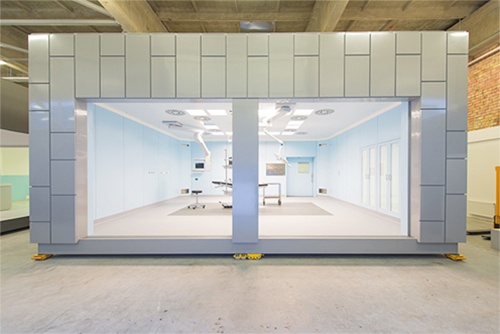
The modular construction industry is varied and can be used for numerous applications such as schools, commercial construction, offices, retail establishments, healthcare, hospitals, military installations, dormitories, hotels, and remote telecommunications stations.
These uses reflect the highly repeatable nature of modular construction, that lends itself well to repeatable assembly line construction.
However, the healthcare is the sector which currently features the highest use of prefabricated modular constructions with the most notable predicted future growth.
In this blog, we talk about Forta Medical and the full business advantages of using LGS modular construction processes – showing just how much of a competitive advantage LGS modular construction can be.
Forta Medical
Forta Medical manufacture and use LGS framing primarily to build high-standard hospitals and clinics – planning, designing and constructing or extending existing buildings.
By using advanced off-site building methods, they are able to provide fast-paced, quick assembly of modular solutions causing minimal disruption to the operations of any surrounding buildings or businesses.
Forta Medical build:
- P Wards
- Delivery rooms
- Intensive Care Units/High Dependency Units (NICU, PICU, MICU)
- Operating Rooms (General, Ultra clean, Septic, Hybrid)
- Outpatient clinics
- Administrative spaces
- Physiotherapy and rehabilitation centres
- Imaging – Radiology centres
- Laboratories
- Logistics units and more
By using this forward-thinking factory prefabrication, it means that Forta Medical are able to achieve much faster construction than would be possible if they were using traditional on-site building methods. And with the healthcare sector leading the utilization of prefabricated modular construction, it is showing to be an ideal fit with the needs of medical facilities. Healthcare is looking to more standardised environments and systematic, efficient construction is perfect for this.
For the past 20 years Forta Medical have been building hospitals in Israel, Latvia, West Africa, Russia and India. Along with these facilities they also currently design, fabricate and install modular units in the UK and Scandinavia, including Norway and Sweden, and they’re continuing to grow further into other European and global markets.
The business advantages of modular construction for the health care construction sector
There are several advantages to using LGS off-site modular construction over traditional methods:
Faster construction time
In a world where time is money, time is always an issue and delays are expensive. With modular construction, buildings are finished earlier and used sooner, giving a faster return on investment.
Modular buildings are constructed at the same time as the site works, meaning projects are completed earlier, often in half the time that it would take for traditional on-site construction. Also as a lot of the modular construction occurs within a factory, construction delays due to unfavourable weather can be avoided.
Cost savings
Budget overruns and financing costs are often a major consideration when building. A very attractive benefit of modular construction is the cost savings it allows due to repeatable and mass production :
- Material savings during procurement
- Labour savings during construction
- Lower overhead costs due to the shorter construction time
- Higher ROI due to earlier opening time of the new building
Minimal impact on surroundings
This point is particularly important for sensitive environments such as hospitals that need to continue to operate to high health and safety standards. Off-site construction means that approximately 80% of building activity is removed from site, and this eliminates most of the construction hazards.
Safer construction
When you are managing a construction project, safety is a major (and real) concern. Accidents are costly in many ways – suffering, time lost, cost to retrain staff, damage to tools, delays, clean-up costs, administrative costs, insurance, bad publicity, and fines amongst these.
When off-site modular construction is used the risk of accidents is greatly reduced. The indoor construction improves conditions, lowers noise and air pollution, traffic and allows for more control of operations.
Low environmental impact
Environmental advantages of LGS modular construction are its lower waste volumes and noise levels. This is stand-out environmental feature when building in these modern and environmentally conscious times.
Could you do the same?
With the success that Forta Medical is having with LGS in the medical construction industry, it raises the consideration of whether there are other industry niches that could benefit from offsite modular construction. And on a personal level, it raises the question of “how could your business benefit?” Or perhaps it would be valuable to explore new niches to benefit from offsite modular construction?
* Forta Medical uses the FRAMECAD LGS System
Want to find out more about the advantages of LGS as a construction method? Download our eBook for free today.
Whether you’re already considering LGS systems for a specific project or are considering establishing a LGS manufacturing or construction business, talk to a FRAMECAD expert today.







